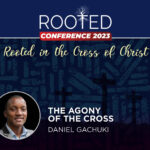At the dawn of the Protestant Reformation, many Reformers adopted a Latin slogan to capture the unfolding wonder: Post Tenebras Lux. It means: “After darkness, light”. The glorious light of the gospel had been eclipsed by empty traditionalism for ages. But now it was breaking out and the darkness was in retreat. Isaiah 9 is a prophecy that foretold an even greater watershed in history. When everything looked dark, hopeless, and bleak, life-giving light suddenly dawned.
Isaiah foretold the greatest watershed in history.
As we approach Christmas, when Isaiah 9 is often cited and sung, let’s consider this prophecy in its original setting, how it was further fulfilled in Christ’s coming, and what it means for us all these centuries later.
Darkness: The Historical Context of Isaiah 9
In Isaiah 7, King Ahaz is flustered because of the threat of the Syro-Ephraimite alliance. His heart “and the heart of his people shook as the trees of the forest shake” (Isaiah 7:2). In a fear-driven political manoeuvre, Ahaz aligns himself to Assyria for deliverance against his imposing foes (2 Kings 16:7-9). This move utterly despised God’s testimonies and promises (Isaiah 7:7-9). Consequently, Isaiah announces that God would use the very Assyrians he’d opted to turn to, to devastate the nation (Isaiah 7:17-20).
Isaiah announces that God would use the very Assyrians Ahaz opted to turn to, to devastate Israel.
As the king went, so did the people. The next chapter shows the nation in a rapid decline, heading into fathomless darkness. The axe of God’s judgement would land on them unabatedly. Isaiah 8 closes by signalling impending doom: “They will look to the earth, but behold, distress and darkness, the gloom of anguish. And they will be thrust into thick darkness” (Isaiah 8:22). On the other hand, the sinful pride and oppression of both Israel and Assyria would lead to their downfall (Isaiah 9:8-10:34). In the final analysis, the power of Syria, Assyria and the whole of Israel would come to nought—a miserable, ruinous end. Pitch darkness.
Dawn: God’s Promised King
Then enters Isaiah 9:1-7, this cascade of light! We suddenly move from “the gloom of anguish” (Isaiah 8:22) to “no more gloom” (Isaiah 9:1). Misery gives birth to mirth. Despondency turns to delight. This chapter introduces the glorious Messianic expectation—an ideal monarch. A conquering Davidic ruler represented under the glorious figure of the sun, rising on this blackened, benighted world and diffusing joy and blessedness wherever he shines (Isaiah 9:1-3). He’d shine forth in beauty, holiness and truth. He’d be the ultimate emancipator (Isaiah 9:4). Unlike all other kings, he’d put an end to war and procure permanent shalom (Isaiah 9:4-6).
That this delivering king would be a child is a hint of the ultimate paradox of the Christian faith.
Yet this conquering and delivering king would be a child, “Immanuel” (Isaiah 7:14; 8:8). This is not only the ironic culmination of Isaiah’s use of children to indicate God’s providential intervention in history (Isaiah 7:3; 8:3), it is also a hint of the ultimate paradox of the Christian faith. For God wields strength through apparent weakness (2 Corinthians 12:10).
Using a “prophetic perfect” (recording future events as if they have already occurred), Isaiah sets forth the person, character, and roles of this great deliverer in the most spectacular terms his language could achieve. He assigns him a fourfold name: Wonderful Counsellor, Mighty God, Everlasting Father, and Prince Of Peace (Isaiah 9:6). These titles allude to the unification of humanity and divinity in him. This God-Man who would set up a universal, eternal Kingdom and “of the increase of his government and of peace there will be no end” (Isaiah 9:7).
Fulfilment and Future
When the curtain rises on the New Testament, the writers of the Gospels reach back to this prophecy. This signals a movement from prediction to fulfilment. The birth of the royal Davidic child is announced (Luke 1:31-33). The name Immanuel is given to him (Matthew 1:22-23). His ministry commences in Galilee recalling Isaiah 9:1-2 (Matthew 4:15-16). Jesus inaugurates a kingdom (Mark 1:15), which is both righteous and eternal (Revelation 11:15). He is the light that pierces the darkness of human sin and misery (John 1:9-13; Luke 1:32).
Jesus is the light that pierces the darkness of human sin and misery.
As the “Wonderful Counsellor,” he embodies and imparts the wisdom of God to us (Colossians 2:3). Being “Mighty God” he vanquishes all our enemies: sin (1 Peter 2:24), Satan (Hebrews 2:14) and death (2 Timothy 1:10). As the “Everlasting Father,” he is not only father-like in demeanour but he also reveals the Father (John 14:9), who loves and forgives his people eternally (Luke 23:34). Lastly, as the “Prince of Peace,” he brings about cosmic peace by his blood (Colossians 1:20), reconciles us to God (Romans 5:1) and fills us with internal peace (John 12:27). Clearly, Isaiah wrote more than he knew.
Seek Comfort in Christ
At Christmas we celebrate the moment when this glorious figure of Isaiah 9 became incarnate. He came to make his dwelling among his people, in order to fulfil his glorious assignment. In a continent like ours, laden with political failure, Christmas reminds us that we have a king like no other. Those who embrace Jesus by faith as the one who was crucified in weakness but raised in power belong to his kingdom of righteousness, justice and peace.
This is not merely an ancient prophecy, it is a source of comfort for us and Christmas underscores this truth.
We can both hold out and onto this hope, that this inaugurated kingdom will soon be consummated. All the evils of corruption, disease, poverty, wars, and misery will be wiped away. Then we shall enjoy his reign of grace forever. So we rest assured. For ”the zeal of the Lord of hosts will do this” (Isaiah 9:7c). Isaiah 9 is not merely an ancient prophecy, it is a source of comfort for us and Christmas underscores this truth.














